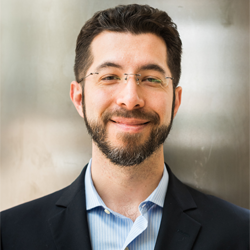
About
Ed Boyden is Y. Eva Tan Professor in Neurotechnology at MIT, an investigator of the Howard Hughes Medical Institute and the MIT McGovern Institute, and professor of Brain and Cognitive Sciences, Media Arts and Sciences, and Biological Engineering at MIT. He leads the Synthetic Neurobiology Group, which develops tools for analyzing and repairing complex biological systems such as the brain, and applies them systematically to reveal ground truth principles of biological function as well as to repair these systems. These technologies include expansion microscopy, which enables complex biological systems to be imaged with nanoscale precision; optogenetic tools, which enable the activation and silencing of neural activity with light; robotic methods for directed evolution that are yielding new synthetic biology reagents for dynamic imaging of physiological signals, such as neural voltage; novel methods of noninvasive focal brain stimulation; and new methods of nanofabrication using shrinking of patterned materials to create nanostructures with ordinary lab equipment. He co-directs the MIT Center for Neurobiological Engineering, which aims to develop new tools to accelerate neuroscience progress, and is a faculty member of the MIT Center for Environmental Health Sciences, Computational & Systems Biology Initiative, and Koch Institute.
Amongst other recognitions, he has received the Wilhelm Exner Medal (2020), the Croonian Medal (2019), the Lennart Nilsson Award (2019), the Warren Alpert Foundation Prize (2019), the Rumford Prize (2019), the Canada Gairdner International Award (2018), the Breakthrough Prize in Life Sciences (2016), the BBVA Foundation Frontiers of Knowledge Award (2015), the Carnegie Prize in Mind and Brain Sciences (2015), the Jacob Heskel Gabbay Award (2013), the Grete Lundbeck Brain Prize (2013), the NIH Director's Pioneer Award (2013), the NIH Director's Transformative Research Award (three times, 2012, 2013, and 2017), and the Perl/UNC Neuroscience Prize (2011). He was also named to the World Economic Forum Young Scientist list (2013) and the Technology Review World’s "Top 35 Innovators under Age 35" list (2006), and is an elected member of the National Academy of Sciences (2019), the American Academy of Arts and Sciences (2017), the National Academy of Inventors (2017), and the American Institute for Medical and Biological Engineering (2018). His group has hosted hundreds of visitors to learn how to use new biotechnologies, and he also regularly teaches at summer courses and workshops in neuroscience, and delivers lectures to the broader public (e.g., TED (2011), TED Summit (2016), World Economic Forum (2012, 2013, 2016)).
Ed received his Ph.D. in neurosciences from Stanford University as a Hertz Fellow, working in the labs of Jennifer Raymond and Richard Tsien, where he discovered that the molecular mechanisms used to store a memory are determined by the content to be learned. In parallel to his PhD, as an independent side project, he co-invented optogenetic control of neurons, which is now used throughout neuroscience. Previously, he studied chemistry at the Texas Academy of Math and Science at the University of North Texas, starting college at age 14, where he worked in Paul Braterman's group on origins of life chemistry. He went on to earn three degrees in electrical engineering and computer science, and physics, from MIT, graduating at age 19, while working on quantum computing in Neil Gershenfeld's group. Long-term, he hopes that understanding how the brain generates the mind will help provide a deeper understanding of the human condition, and perhaps help humanity achieve a more enlightened state. His full CV is posted here.
Research
Our group, centered in the MIT McGovern Institute and Howard Hughes Medical Institute, and jointly affiliated with the MIT Department of Biological Engineering and the MIT Department of Media Arts and Sciences, and the Yang Tan Collective, works on inventing and applying new tools for the analysis and engineering of brain circuits. We have been developing molecules, hardware, and methods to activate, silence, record, and analyze neural activity and circuit signaling, throughout brain circuits. We also work on ways to map the molecular structure of the brain. We distribute our tools as freely as possible to the scientific community, and also apply them to the systematic analysis of brain computations, aiming to reveal the fundamental mechanisms of brain function, and yielding new, ground-truth therapeutic strategies for neurological and psychiatric disorders. One primary goal is to create biologically accurate computer simulations of brains. These technologies include expansion microscopy, which enables complex biological systems to be imaged with nanoscale precision; optogenetic tools, which enable the activation and silencing of neural activity with light; robotic methods for directed evolution that are yielding new synthetic biology reagents for dynamic imaging of physiological signals; novel methods of noninvasive focal brain stimulation; and new methods of nanofabrication using shrinking of patterned materials to create nanostructures with ordinary lab equipment.
Teaching
9.422J Principles of Neuroengineering
9.455J Revolutionary Ventures
9.123J Neurotechnology in Action
Publications
Awards + Honors
National Academy of Sciences, elected member (2019)
Croonian Medal (2019)
Warren Alpert Foundation Prize (2019)
Rumford Prize (2019)
Canada Gairdner International Award (2018)
Howard Hughes Medical Institute, Investigator (selected; appointment in process) (2018)
Breakthrough Prize in Life Sciences (2016)
American Academy of Arts and Sciences, elected member (2017)
BBVA Foundation Frontiers of Knowledge Award (2015)
Carnegie Prize in Mind and Brain Sciences (2015)
Jacob Heskel Gabbay Award (2013)
NIH Director's Pioneer Award (2103)
Grete Lundbeck European Brain Research Prize (“The Brain Prize”) (2013)
Perl/UNC Neuroscience Prize (2011)

